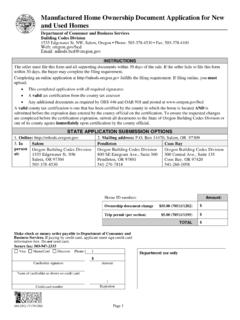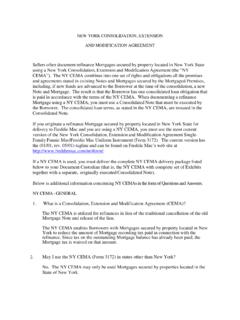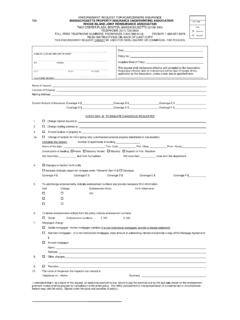Transcription of Massachusetts Foreclosure Law Summary
1 Massachusetts Foreclosure Law Summary Foreclosure Summary Quick Facts - Judicial Foreclosure Available: Yes - Non-Judicial Foreclosure Available: Yes - Primary Security Instruments: Deed of Trust, Mortgage - Timeline: Typically 90 days - Right of Redemption: No - Deficiency Judgments Allowed: No In Massachusetts , lenders may foreclose on deeds of trusts or mortgages in default using either an entry by possession or non-judicial Foreclosure process. Foreclosure by Possession After the borrower defaults on the mortgage, the lender may recover possession of the property by: 1) obtaining a court order; 2) entering the property peaceably; and 3) by proper consent of the buyer. If the lender maintains possession peaceably for three years from the date of possession, the borrower loses all rights of redemption. Non-Judicial Foreclosure The non-judicial process of Foreclosure is used when a power of sale clause exists in a mortgage or deed of trust.
2 A "power of sale" clause is the clause in a deed of trust or mortgage, in which the borrower pre-authorizes the sale of property to pay off the balance on a loan in the event of the their default. In deeds of trust or mortgages where a power of sale exists, the power given to the lender to sell the property may be executed by the lender or their representative, typically referred to as the trustee. Regulations for this type of Foreclosure process are outlined below in the "Power of Sale Foreclosure Guidelines". Power of Sale Foreclosure Guidelines If the deed of trust or mortgage contains a power of sale clause and specifies the time, place and terms of sale, then the specified procedure must be followed. Otherwise, the Foreclosure may proceed as follows: 1. A notice of sale must be recorded in the county where the property is located. The notice must also: 1) be sent, by registered mail, to the borrower at his last known address at least fourteen (14) days prior to the Foreclosure sale; 2) published once a week for three (3) weeks, with the first publication being at least twenty one (21) days before the sale, in a newspaper of general circulation within the county where the property is located.
3 Said notice must contain the place, time and date of the Foreclosure hearing, the date the mortgage was recorded, the borrowers name, the amount of the default and the terms of the sale. 2. The sale must be conducted at public auction on the date, time and place specified in the notice of sale. The property will be sold to the highest bidder. The borrower has no rights of redemption. Source: Massachusetts Foreclosure Law Chapter 244: Section 1 Foreclosure by entry or action; continued possession Section 1. A mortgagee may, after breach of condition of a mortgage of land, recover possession of the land mortgaged by an open and peaceable entry thereon, if not opposed by the mortgagor or other person claiming it, or by action under this chapter; and possession so obtained, if continued peaceably for three years from the date of recording of the memorandum or certificate as provided in section two, shall forever foreclose the right of redemption.
4 Chapter 244: Section 2 Entry without judgment; memorandum or certificate; recording Section 2. If an entry for breach of condition is made without a judgment, a memorandum of the entry shall be made on the mortgage deed and signed by the mortgagor or person claiming under him, or a certificate, under oath, of two competent witnesses to prove the entry shall be made. Such memorandum or certificate shall after the entry, except as provided in section seventy of chapter one hundred and eighty-five, be recorded in the registry of deeds for the county or district where the land lies, with a note of reference, if the mortgage is recorded in the same registry, from each record to the other. Unless such record is made, the entry shall not be effectual for the purposes mentioned in the preceding section. Chapter 244: Section 3 Declaration by mortgagees; conditional judgment Section 3. The mortgagee in an action for possession may declare on his own seisin, stating that it is in mortgage; and if the court finds upon verdict or otherwise that the plaintiff is entitled to possession of the land for breach of condition, it shall upon motion of either party, except as provided in the following section, award a conditional judgment.
5 Chapter 244: Section 4 Procedure Section 4. Unless the defendant is the mortgagor or his assignee, or entitled to hold or claim the land under the mortgagor or his assignee, he shall not redeem the land nor have a conditional judgment, except with the consent of the plaintiff, but the action shall be conducted like an action for possession, and in all cases the judgment for the plaintiff may be entered for possession as at common law, unless one or the other of the parties moves for the conditional judgment. Chapter 244: Section 5 Form of conditional judgments generally Section 5. If the conditional judgment is to be entered, the court shall determine the amount due to the plaintiff on the mortgage, and shall enter judgment that if the defendant within two months after the judgment pays to the plaintiff such amount with interest and the costs, the mortgage shall be void, and the defendant shall hold the land discharged thereof; otherwise, that the plaintiff shall have execution for possession and for costs.
6 Chapter 244: Section 6 Form in special cases Section 6. If the condition of the mortgage is not for the payment of money, or if a part only of the money, the payment of which is secured by the mortgage, is due, the court shall vary the terms of the judgment as the case may require, but shall award execution as before provided unless the defendant within two months after the judgment performs the conditions thereof. Chapter 244: Section 7 Discharge or release on satisfaction of execution Section 7. If, after an execution on a judgment for possession has been levied, the amount due on the mortgage and costs are paid in full, the mortgagee , his executor, administrator or assigns shall, at the expense of the mortgagor, enter on the margin of the record of the execution an acknowledgment of satisfaction or make to the mortgagor a deed of release, which shall be recorded with notes of reference to the execution discharged thereby.
7 Chapter 244: Section 8 Form of action; parties Section 8. The entry may be made or the action brought by an assignee of the mortgagee . The action for possession may be brought, and shall be conducted as if brought by the original mortgagee . The mortgagor may be joined therein as a defendant irrespective of his estate in the land; but if he has no estate in the land and makes no defence to the action, he shall not be liable for costs. Chapter 244: Section 9 Right of entry before breach Section 9. This chapter shall not prevent a mortgagee or person claiming under him from entering on the land or from recovering possession thereof before breach of condition of the mortgage, if there is no agreement to the contrary; but if the debt is afterward paid or the mortgage redeemed, the amount of the clear rents and profits from the time of the entry shall be accounted for and deducted from the amount due on the mortgage.
8 Chapter 244: Section 10 Foreclosure and redemption where entry made before breach Section 10. A mortgagee , or a person claiming under him in possession under the preceding section, may, after breach of condition, make a new formal entry for breach of condition, or bring an action, under section one, with the same effect as if he were not in possession; or he may foreclose the right of redemption by giving, after breach of condition, to the mortgagor, or person claiming under him, a written notice that he will thenceforward hold the land for the purpose of Foreclosure and causing a certificate in proof thereof to be recorded within thirty days after such notice as in case of an original entry. If such notice is given and recorded, the three years limited for redemption shall run from the date of giving the notice. Chapter 244: Section 11 Mortgages containing power of sale; court order for sale Section 11. If a conditional judgment has been entered upon a mortgage containing a power of sale, the court shall, instead of issuing a writ of possession, at the request of the plaintiff order the property to be sold pursuant to such power.
9 The plaintiff shall thereupon execute the power and do all things required by it or by the court. Chapter 244: Section 12 Procedure after sale Section 12. The person selling shall, within ten days after the sale, file in the clerk's office a report on oath of the sale and of his doings, and the court may confirm the sale or set it aside and order a re-sale. Any person interested may appear or be summoned, and the order of the court confirming the sale shall be conclusive evidence against all persons that the power of sale was duly executed. Chapter 244: Section 13 Necessary parties Section 13. Unless the defendant is seized in fee simple in possession of the whole equity of redemption of the land demanded, an order for a sale shall not be made until all parties interested in the equity of redemption and whose estate or interest therein would be affected by such sale have been summoned to appear. Chapter 244: Section 14 Foreclosure under power of sale; procedure; notice; form Section 14.
10 The mortgagee or person having his estate in the land mortgaged, or a person authorized by the power of sale, or the attorney duly authorized by a writing under seal, or the legal guardian or conservator of such mortgagee or person acting in the name of such mortgagee or person, may, upon breach of condition and without action, do all the acts authorized or required by the power; but no sale under such power shall be effectual to foreclose a mortgage, unless, previous to such sale, notice thereof has been published once in each of three successive weeks, the first publication to be not less than twenty-one days before the day of sale, in a newspaper, if any, published in the town where the land lies or in a newspaper with general circulation in the town where the land lies and notice thereof has been sent by registered mail to the owner or owners of record of the equity of redemption as of thirty days prior to the date of sale, said notice to be mailed at least fourteen days prior to the date of sale to said owner or owners to the address set forth in section sixty-one of chapter one hundred and eighty-five, if the land is then registered or, in the case of unregistered land.




